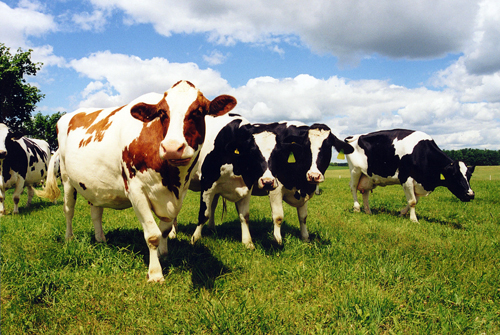Story by Anna Wassermann, a writer for SPARK (Students Promoting Awareness of Research Knowledge)

The impact of cattle disease on productivity can be costly to dairy producers. An award-winning genetic tool developed by a research team at the University of Guelph is helping improve profit margins by naturally improving disease resistance in cattle.
The team, led by Prof. Bonnie Mallard of the Department of Pathobiology and member of the Centre for Genetic Improvement of Livestock, has developed a patented test system known as High Immune Response (HIR) technology, which is marketed under the trademark Immunity+.
Licensed by U of G’s Catalyst Centre to the Semex Alliance, Canada’s largest dairy genetics company, Immunity+ is a test that can determine which animals have the ability to produce the most robust and balanced immune responses. These cattle are considered to be high immune responders because they have superior overall health, vaccine responsiveness, colostrum quality and the ability to combat infectious disease.
As a result of these traits, Immunity+ cattle have lower disease occurrence, improving both food quality and safety.
Immunity+ was recently named one of the Top 10 Innovative Products of 2013 in Dairy Herd Management at the prestigious World Dairy Expo.
“It’s an honour to be recognized like this at the biggest dairy event in the world,” says Mallard. “This technology is what many researchers dream of – from concept to the lab to a company to the marketplace.”
The HIR test involves three farm visits in which blood or milk samples are taken from the cows, their skin-fold thickness is measured and they are immunized with two different proteins. The animal’s ability to respond to the test antigens in the vaccine determines its immune response.
HIR animals have been shown to have up to 50 per cent lower incidence of disease than low immune response animals.
This new technology for breeding disease resistant cattle is beneficial because the traits measured are highly heritable, allowing breeding to improve successive generations of offspring. After being tested, each animal receives a breeding value for immune responsiveness, allowing producers to select Immunity+ sires to breed for improved herd health.
Aimed at dairy producers and industry partners alike, the World Dairy Expo features cutting-edge research and modern technology. Last year’s event was attended by more than 70,000 members of the dairy industry.
Semex believes Immunity+ will be a “game changer” in increasing dairy profitability. The emerging technology will revolutionize the way dairy producers look at developing genetic strategies for their herds by breeding the healthiest, most efficient animals.
Mallard says many colleagues, graduate students and staff have been involved in this research over the years, including Bruce Wilkie, professor emeritus in Pathobiology, and the late Prof. Brian Kennedy, Animal and Poultry Science. Recent graduate students Lauraine Wagter-Lesperance and Kathleen Thompson-Crispi have also made important contributions.
Research sponsors include the Natural Sciences and Engineering Research Council of Canada, the Ontario Ministry of Agriculture and Food, the Ontario Ministry of Rural Affairs and the Canadian Dairy Network.